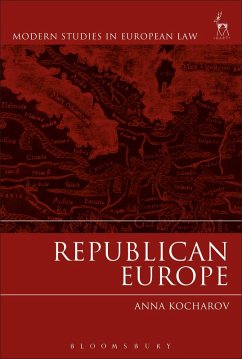Constitutional orders constitute political communities - and international orders deriving from them - by managing conflicts that threaten peace. This book explores how a European political community can be advanced through EU constitutional law. The constitutional role of the Union is to ensure peace by addressing two types of conflict. The first are static conflicts of interests between the national polities in the EU. These are avoided by ensuring reciprocal non-interference between Member States in the Union through deregulation in Union law. The second are dynamic conflicts of ideas about positive liberty held by the peoples of Europe. These can be resolved through regulation in a European political space. Here, EU law enables a continuous process of re-negotiating a shared European idea of positive liberty that can be accepted as its own by each national polity in the EU. These solutions to the two types of conflicts correspond to the liberal and republican models for Europe. The claim of this book is that the constitutional design of Europe presents both liberal and republican features. Taking an innovative approach, which draws on arguments from substantive law, constitutional theory, case law analysis, insights from psychology and philosophy, it identifies how best to strengthen the Union through constitutional law.
Bitte wählen Sie Ihr Anliegen aus.
Rechnungen
Retourenschein anfordern
Bestellstatus
Storno


